Rabbits don’t lay eggs
We’ve been building up to the Easter half-term break with some egg-streamly egg-citing activities!
Rabbits Don’t Lay Eggs
We’ve been reading Rabbits Don’t Lay Eggs by Paula Metcalf.

Top tip for watching YouTube with your child: go to the settings cog along the play bar and turn off auto play – this avoids an inappropriate clip coming up automatically, and helps to discourage your child from passively watching clip after clip.
The story begins on a farm, with a rabbit named Rupert. All he wants is to be useful but unfortunately, he struggles to find anything he’s good at. Luckily, he soon finds an unexpected job on the farm!
Our ‘word of the week’ is creation – something that is made or created.
We also spotted some other adventurous words in the story:
Giggled to laugh lightly and repeatedly (a lot) in a silly way.
Glumly to look unhappy and disappointed.
In our writing, we transcribed the sentence Chicks are born on a farm. We also had a go at creating our own sentences, with spring pictures to inspire us!

Understanding the World; Easter
Through our literacy and RE learning, we’ve been discussing how we celebrate Easter and where our traditions come from.
We learnt that Easter is a Christian celebration and listened to the Easter story.
In provision, we’ve been exploring lots of Easter themed activities- we’ve loved going on egg hunts in the garden!


Maths
In Maths, we’ve been identifying the same and different attributes of various objects – e.g. colour, size, shape. We’ve been choosing ways to sort the objects.
We have also re-visited ways to identify ‘odd’ and ‘even’ numbers- we noticed that all of our even numbers are doubles!

In provision, we’ve been exploring doubles by putting the same number of eggs into 2 baskets and finding the total amount, we’ve been making repeating patterns using Easter objects and we’ve been playing a subtising/counting game! What a lot of maths skills!

Farmer Luke
On Thursday, we caught up with Farmer Luke via Zoom.
He started by showing us the tractor he uses to plant seeds and showed the children that these special tractors have tracks, not wheels, to protect the soil.
Luke showed us the different parts of the cultivator that work together to plant the grass seeds.
He asked the children to guess one of the plants- well done to Jenson, who knew it was a blackberry bush! Luke sends blackberries off in June/July to be turned into Ribena- yum!
Luke then answered some of our questions. We learnt lots, such as how long it takes for the grass to grow, where the tractors are kept and which jobs happened on the farm over winter.
We found out that winter is “less busy”. Lots of small jobs happen, such as pruning, farming the chickens, trimming edges and chopping up wood from fallen trees. Luke said “now it’s spring and things are growing, there’s lots more jobs to do!”

Bean Plants

Before we sent our bean plants home this week, we looked closely at the changes and how they had started to grow. If you decide to plant your bean at home, we’d love to see!

Poetry Picnic
Each week we will be learning a new poem. We will recite this poem each day. By saying the poem out loud, we can focus on the sounds and rhythm of each word or line. We talk to the children about how this can help us become better readers. This week’s poem is called A Little Seed.

We talk about how a poem sometimes has rhyming words and sometimes doesn’t. Can your child tell you the rhyming words in this week’s poem? We also talk about how a poem can have a fast rhythm or a slow rhythm.
We always look at two words in the poem and share the definition. This week, we looked at the following words.
sow – plant (seed) by scattering or putting in soil
shower – a short period (time) of rain
click here to watch Reception recite this week’s poem!
Egg rolling competition!
We finished the week with our egg rolling competition. We saw super- creative decorated eggs- thank you for your amazing efforts. Well done to our winners, whose eggs rolled their way to victory!

Home learning
Can you write a diary about your half term? A sentence a day would be fantastic! Please bring your diary in to share when we return to school.
Writing reminder…
Remember, it is okay for things to be spelt phonetically. It is important your child grows into an independent learner. Encouraging your child to write the words as they sound rather than always spelling correctly is important. It encourages your child to use their own skills – rather than copy from an adult.
It is important you do not let your child simply copy your writing. They need to use their phonics skills to write. Here is an example of a child’s writing in Reception.
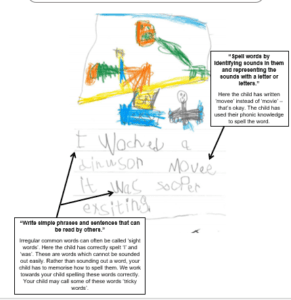
Final message and getting ready for year one!
On your return to school on the 22 April, we’ll be entering the final full term of Reception. The first step of the transition towards year one, is getting the children ready to come into school independently.
To support us with this, we are asking that children enter the classroom/cloakroom on their own from 22 April. We know a few children have started to do this already, which is great to see!
We encourage you to wave goodbye at the waving window and our door is always open for you to continue to pop in for a chat, if needed.
Thank you for your support.
We wish you all a lovely half-term break- see you in 2 weeks!

Reminders and Dates
SWIMMING DATES- Summer 1

The Tiny Seed
This week, we’ve been reading The Tiny Seed by Eric Carle.
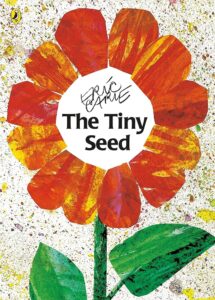
Some of the children recognised the illustrations, knowing that the author also wrote The Very Hungry Caterpillar.
The story follows the journey of a tiny seed, tracking its journey through the four seasons.
We decided to go on a season walk to find signs of spring. The children spotted buds, leaves, blossom, snails and even the sun!
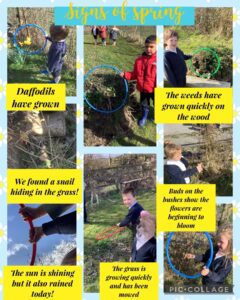
Miniscule is our ‘word of the week’. We’ve been learning that miniscule is even smaller than tiny!
Maths
In Maths, we’ve been doubling! Ask your child explain how we find doubles.
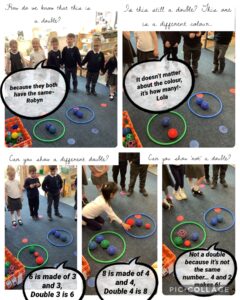
Phonics
Spring 2 week 5 has been a review of phase 3 sounds. We’ve been reading longer words, words with s in the middle /z/ (like ‘visit’), words ending –s and words with –es at end /z/ (like ‘foxes’)
Poetry Picnic
Each week we learn a new poem and recite it every day. By saying the poem out loud, we can focus on the sounds and rhythm of each word or line. We talk about how this can help us become better readers. This week’s poem is called Hungry Birdies.
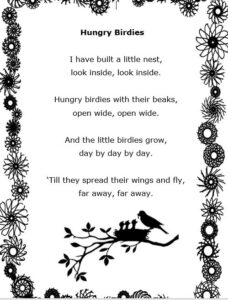
We talk about how a poem sometimes has rhyming words and sometimes doesn’t. Can your child tell you the rhyming words in this week’s poem? We also talk about how a poem can have a fast rhythm or a slow rhythm.
Click here to watch us recite this week’s poem!
Jack and the Beanstalk
It has been another fun-filled week in reception!
Jack and the Beanstalk
This week, we’ve been reading the traditional story ‘Jack and the Beanstalk’.


We discussed how this story has been retold many times and some versions of the story are different. Just by looking at two front covers, we could spot similarities and differences.
In my book, Jack had a magical harp.
It has a beanstalk on the front.
The giant is in that one but not the other one.
This week, our word of the week was gigantic.
Observational drawing
This week, we have focused on drawing daffodils.

Planting a (magic) bean
After listening to the story, the children all agreed that we should plant our own bean.


We then wrote instructions to explain to others how they could plant a bean too!

Maths
In Maths, we’ve been exploring the composition of numbers by investigating the numbers within 6 and 7 e.g. seeing that 7 can be made of 5 and 2.
On Tuesday, we were joined by adults for a stay and learn session. We engaged in different activities based on composing 6, 7 and 8.

Phonics
This week, we have continued to read longer words with the chunking method.
We have also begun to read root words that make up compound words and discussing how the two root words create a new word with a new meaning.
Can your child show you the chunking method to read these words?
fantastic helmet zooming winking
Read these root words, then combine to make a compound word.
roof top farm yard car park
In provision, we’ve been making beanstalks by reading tricky words!

Poetry Picnic
Each week, we will be learning a new poem. We will recite this poem each day. By saying the poem out loud, we can focus on the sounds and rhythm of each word or line. We talk to the children about how this can help us become better readers. This week’s poem is Spring Wind.
We talk about how a poem sometimes has rhyming words and sometimes doesn’t. Can your child tell you the rhyming words in this week’s poem? We also talk about how a poem can have a fast rhythm or a slow rhythm.
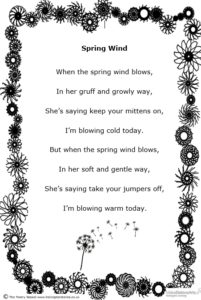
The 100 Decker Bus
The Hundred Decker Bus
This week, we’ve been reading another ‘Hundred Decker’ story by Mike Smith. The Hundred Decker Bus.

Top tip for watching YouTube with your child: go to the settings cog along the play bar and turn off autoplay – this avoids an inappropriate clip coming up automatically, and helps to discourage your child from passively watching clip after clip.
In this story, a driver who is bored of his daily routine decides to take himself and his passengers on a long ‘adventure’. As more people get on the bus, more decks need to be built!
Linked to the story, we’ve been comparing cities/towns to the countryside and discussing the similarities and differences. Countryside is our ‘word of the week’.

Maths
In Maths, we’ve been comparing numbers and noticing whether change creates a number that is more or less than another. In provision, we used the ‘bus stop’ number story to explore subtraction (creating less) and recorded our number stories.

Phonics
Spring 2 week 3 has been a review of phase 3 sounds, reading words with two or more digraphs (2 letters that make 1 sound). We review tricky words (a word you can’t sound out – you just have to know it) daily.
Tricky words can be just that-tricky! We’ve previously introduced a few fun games you can play at home to practice tricky words. Here’s another you could try…
Tricky word stick person (a modified version of the ‘hangman’ game)

We often play this game in class. Write the correct number of dashes for your chosen tricky word and let your child make guesses. Encourage your child to use letter names rather than sounds for spelling tricky words. Draw a part of the stick man for each incorrect guess- you can give extra chances by adding a hat, shoes, gloves etc. to the stick person!
Poetry Picnic
Each week we learn a new poem and recite this poem every day. By saying the poem out loud, we can focus on the sounds and rhythm of each word or line. We talk to children about how this can help us become better readers. This week’s poem is the traditional nursery rhyme Pat-a-cake, Pat-a-cake.
We talk about how a poem sometimes has rhyming words and sometimes doesn’t. Can your child tell you the rhyming words in this week’s poem? We also talk about how a poem can have a fast rhythm or a slow rhythm.
Reading reminder
Children should be reading fluently by the time their book is issued on-line at the end of the week. Your child will have read their book at least 4 times at school – this is where the teaching of reading happens. The aim of reading sessions at home is to celebrate their reading and to showcase what they have learnt during the week. It’s a great way for your child to recognise themselves as a ‘reader’.
If you believe your child is reading from memory you can ‘spot check’ particular words in a sentence or play games with the e-book (such as spotting tricky words).
Remember to encourage reading for pleasure through sharing library books, magazines and other texts at home.
Reminders and Dates
‘Number’ Stay and learn – Tuesday 18 March 9:00am
Our Stay and Learn sessions are a chance to find out more about your child’s journey through Reception. You can observe some teaching and learning, and pick up some tips to support your child at home. This session is all about Number.
Railways, Reading and Rockets!
The National Railway Museum
On Monday, the children had a fantastic time at The National Railway Museum. They were very excited to go on their first ever school trip – especially travelling there by coach! We were super impressed with how well-behaved the children were. Well done, Reception class.
The children enjoyed looking at different trains and making comparisons of old and new. They had lots of fun watching the miniature railway and it led to lots of great discussions about trains, tunnels and transport. The children especially enjoyed sitting on the Japanese Bullet train.
To end our wonderful visit, we drew our favourite train of the day!

Literacy
We’ve been reading The Hundred Decker Rocket, by Mike Smith.

This story is about a girl called Ivy who sets off on an expedition to space- expedition is our word of the week! On the way, she meets some very messy aliens. When her rocket breaks down, the aliens help to fix it and make their own deck.
The story inspired lots of discussion around keeping our planet clean and why this is important.
In our writing, we designed our very own rocket deck that we will be making next week- this is where we need your help…
Please send your child into school with an empty shoebox next week. The children will be creating their very own deck, based on their designs.

Computing; Beebots
We’ve continued exploring Beebots. Beebots are a fun, early coding resource. We program the bee using directional buttons. The children had to pre-plan the algorithm they needed to enter, to successfully get the bee to its intended location (for example, a specific spot on the carpet)

Living and learning; Celebrating differences
Our living and learning statement this week is: I know we’re all the same and we’re all different.
On Wednesday, were were visited by Lindsey from Diversity Role Models.
The children listened to the story Mixed by Arree Chung
a charming and thought-provoking picture book with characterful illustrations and humour. Follow the colours as they overcome their differences in this sweet tale of acceptance and celebrating difference.
The children loved the story and it introduced us to some new, important vocabulary; diversity, harmony, vibrant.
The children had some thoughtful answers to Lindsey’s questions:
Why is being different good? “’cause we all like different things”-Lola
What would happen if we were all the same? “it would be confusing”- Robyn, “it would be boring”-Delilah

World Book Day
Thank you to the parents and carers who were able to join us for our stay and read session on Thursday, for World Book Day.
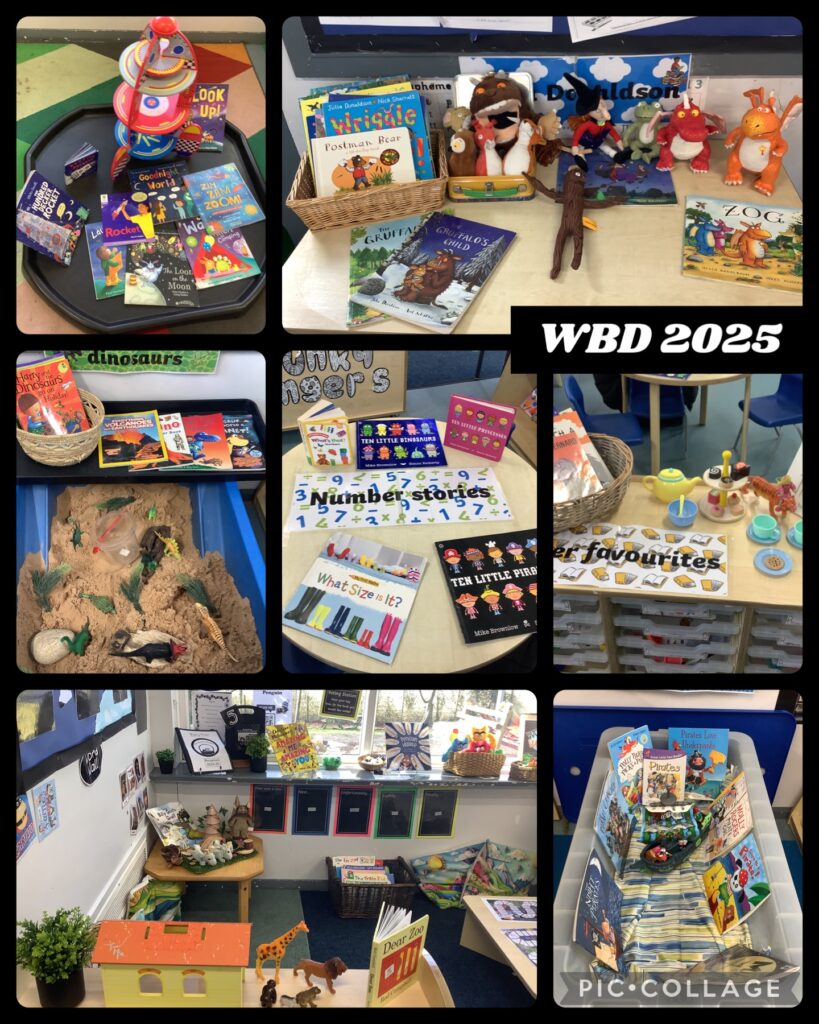


As part of our celebrations, the children enjoyed talking about their favourite books from home.
Another highlight of the day was when our friends from years 5/6 came to class to read with us!

On Tuesday, the children took part in a live story and draw-along with the author (Swapna Haddow) and illustrator (Aditi Kakade Beaufrand) of The Night Before Holi
As well as an opportunity to enjoy a new story, the children learnt about this Hindu festival, which welcomes the arrival of springtime.

Phonics
This week, the children have reviewed air, er and longer words that contain double letters.
Help at home; phonics challenge
Write these words on paper and ask your child to underline the double letters before reading them.
hammer shimmer cannot chatter muffin
Tricky words can be just that-tricky! We’ve previously introduced a few fun games you can play at home to practise tricky words. Here’s another you could try…
Secret password
Write different tricky words on paper and stick them next to different doors around the house.
Each time your child enters or leaves a room they must press and say the tricky word password.

Poetry Picnic
Each week we learn a new poem and we recite this poem every day. By saying the poem out loud, we can focus on the sounds and rhythm of each word or line. We talk to the children about how this can help us become better readers. This week’s poem was Pancakes by Christina Rossetti

We talk about how a poem sometimes has rhyming words and sometimes doesn’t. Can your child tell you the rhyming words in this week’s poem? We also talk about how a poem can have a fast rhythm or a slow rhythm. Can your child re-tell this week’s poem to you?
We hope you enjoyed watching the children recite this week’s poem aloud, in LIVE ACTION during our stay and read on World Book Day!
Dates for your diary
Reception’s Class Assembly- Thursday 13 March, 2.45pm
Stay and learn: Number Session 2- Tuesday 18 March, 9-10am This is an opportunity for you to come into school to find out about the Early Years Curriculum and watch your child learning in school. This session is our second with a focus on maths.

These dates are also stuck to your child’s classroom door or window to view whenever needed.
The Train Ride
We’ve sprung into Spring 2 with great excitement for the term ahead! We are very impressed with how both Sunshine and Rainbow class have shown a readiness to learn. The children have been really excited to share with their friends all the adventures they have been up to during half term.
The Train Ride
This half term is called Let’s Go! We’re starting with a focus on transport. This week, we’ve been reading The Train Ride by June Crebbin.

This story is about things that are seen out of the window, on a train journey. We noticed that the rhythm of the book’s repeated/rhyming lines start fast and repetitive (much like the sound of a train chugging along a track) and then as the train approaches the station, the lines become longer and the pace slows down until the train reaches is destination. Destination is our ‘word of the week’.
Historical links
We looked at pictures of the early steam locomotive- Robert Stephenson’s Rocket. We compared it to the trains we use today.

We are excited to see the replica train at the museum!
Maths: Comparison
We’ve been comparing groups of objects and toys, saying which has more and which has fewer. We’ve been using our mathematical reasoning to explain why size, colour and other factors do not matter when comparing ‘how many’.
In the classroom, children have been making 6 using Numicon frames.

ICT- Programming a BeeBot
We’ve been learning how to programme a BeeBot. This week we’ve been ‘having a go’ at pressing the buttons and making them move. We’ll be continuing our learning over the next few weeks, learning about algorithms and programming. We will learn to use sequences of instructions, to programme the BeeBot to reach a destination.

Phonics
Spring 2 week 1 has been a review of phase 3 sounds: ai, ee, igh, oa, oo, ar, or, ur, oo, ow, oi, ear, in words and sentences. We review tricky words daily.
Tricky words can be just that-tricky! We’ve previously introduced a few fun games you can play at home to practice tricky words. Here’s another you could try.
Roll and Read
You will need a die for this game. You may wish to print the boards or display them on a screen.
- Roll the die
- Count the spots, match to the correct row
- Choose a word to read on the row
- Cover the word when read correctly
- Repeat
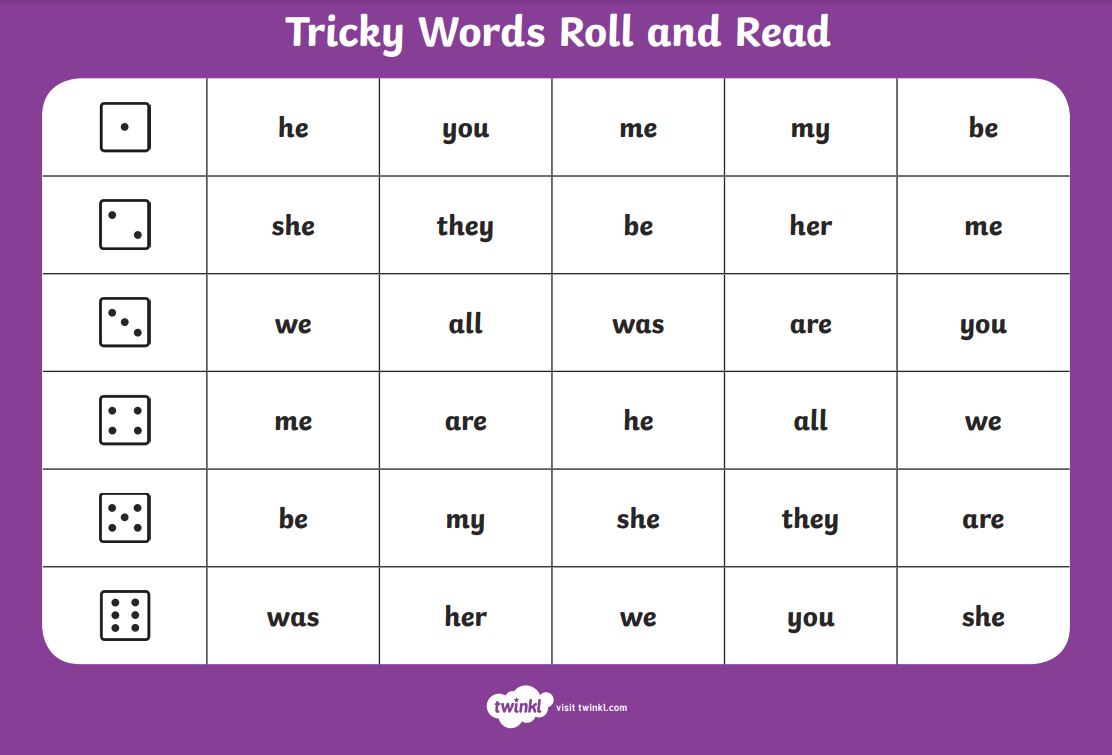
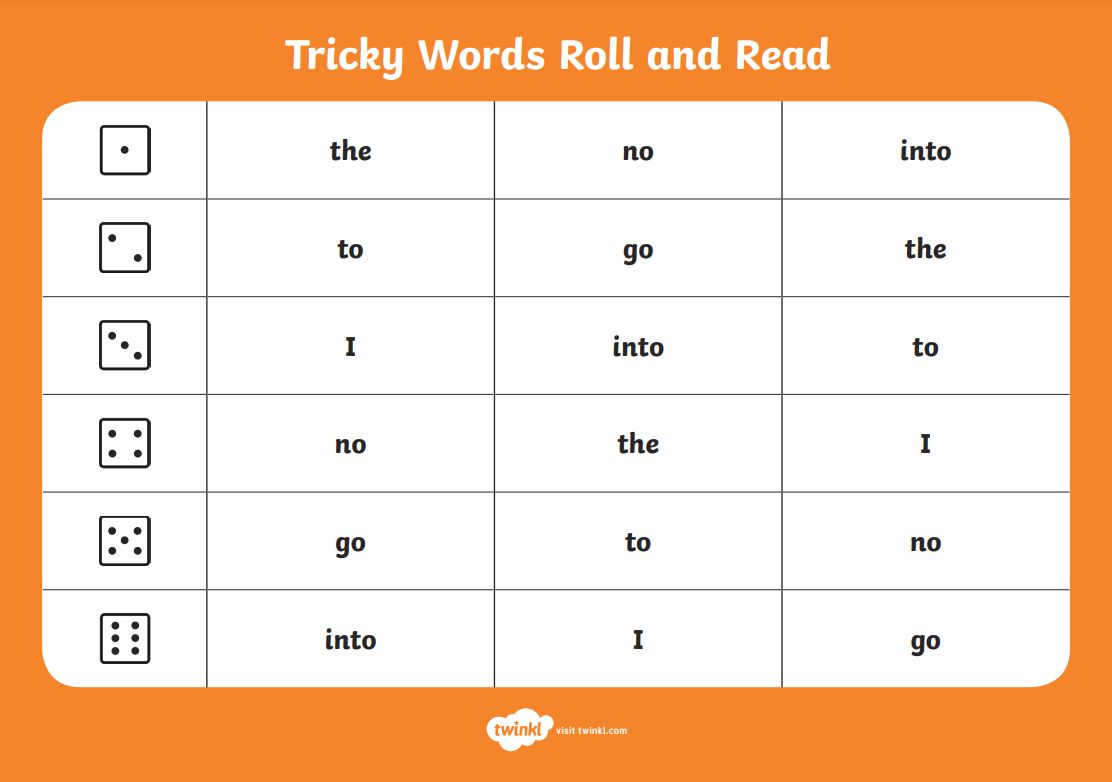
Who will be the first to complete a row?
Reminders and Messages
Monday 03 March- Class Trip to The National Railway Museum.
World Book Day 2024- Thursday 06 March Please join us in the classroom (8.35-9.15) where you can relax and read books with your child. We’d also like your child to share their favourite book with their friends. Please send your child into school with their favourite book and please ensure the book is named. As stated on the school calendar, this not a dressing up year.
Great Fairies of the World
This week, we’ve been reading Great Fairies of the World by Stephanie Moss. This rhyming story features fairy characters that have jobs that help others; architect fairy, doctor fairy and engineer fairy, to name just a few! We’ve been discussing how the author uses the most interesting descriptions/words that they can think of. We’ve been describing images and making words more adventurous. This has helped develop our oracy skills and helped us in our writing too.

In our writing, we’ve created our own fairy characters and written about the jobs that they do.
In provision, we’ve linked our fiction reading to non-fiction information about real-life heroes in the community.

We’ve also used the fairy theme in our classroom challenges.

Living and learning: Internet Safety
We joined in with learning about Safer Internet Day on Tuesday 11 February.
When asked what being ‘online’ means and what you can do online, children had lots of ideas. Many of them talked about different games and programmes that they play and watch on-line at home.
We spoke about some important uses for the internet, such as the way we use it for our learning- our eBooks. We also discussed how we should limit our time online to keep our body and brain healthy and why we shouldn’t use electronic devices close to bed time.
In Reception, we used the story The Adventures of Smartie the Penguin to talk about internet safety. Smartie receives a tablet for his birthday but encounters some problems when using it, including adverts, websites that are too old for him and people saying unkind things online, during a game. He makes the right decisions and always asks Mummy and Daddy for help. There is a memorable song throughout the story:

Ask your child what they can remember about keeping safe online.
Maths: Length and height
We’ve been developing our understanding of how to compare and measure length and height. We’ve been ordering by length and comparing the length of objects; saying which are shorter, longer, the shortest, the longest or the same (equal). We’ve been measuring objects using non-standard forms of measurement. We measured the length of our bodies using different objects.

Phonics
It was assessment week in phonics and we’ve been reviewing and revisiting our Spring 1 learning. Your child will have come home with a grapheme mat and a tricky word mat. If any sounds are highlighted on the grapheme mat, these are those that your child is not yet secure on. Please keep practising these at home.
Tricky words can be just that-tricky! In Little Wandle phase 3, we learnt lots of new words. The children will continue to learn new tricky words fairly rapidly so it’s important to keep practising them. We’ve previously introduced a few fun games you can play at home to practice tricky words. Here’s another you could try!
Help at home: Musical tricky words

- Write the tricky words on individual pieces of paper, lay them out on the floor.
- Play your child’s favourite song for them to dance to.
- When the music stops, your child should pick a word to quickly run to and stand on.
- Your child reads the word they have landed on.
- Remove that word and repeat until there are no words left!
Poetry Picnic
Each week we learn a new poem and we recite this poem every day. By saying the poem out loud, we can focus on the sounds and rhythm of each word or line. We talk to the children about how this can help us become better readers. This week’s poem was Furry, furry squirrel.

We talk about how a poem sometimes has rhyming words and sometimes doesn’t. Can your child tell you the rhyming words in this week’s poem? We also talk about how a poem can have a fast rhythm or a slow rhythm. Can your child re-tell this week’s poem to you?
Parent-teacher meetings
Thank you to all the parents and carers who came to the parent-teacher meetings this week. It was great to see you all there, keen to find out how your child is doing in school and how you can continue to support at home.
A few people asked about how to say the graphemes correctly, using pure sounds – here are links to help you pronounce Phase 2 graphemes and Phase 3 graphemes.
If you’d like to email us any photos of your child’s home learning, share any achievements or tell us about any exciting events, please send them to our Reception email. Children love to share them with their friends and it’s also great for their confidence and communication skills too!

Reminders
SWIMMING DATES- Spring 2
Rainbow Class- 26 Feb, 12 Mar, 26 Mar
Sunshine Class- 5 Mar, 19 Mar, 02 Apr
These dates are also stuck to your child’s classroom door or window to view whenever needed.
Sponsored maths challenge – Please see the Sponsored Tens Frame Challenge letter that has been sent home this week.
World Book Day 2025: Stay and Read – Thursday 06 March. Further details to follow (see calendar).
Happy half term! Enjoy the break and we’ll see you again on Monday 24 February.
Supertato
On Monday morning, we welcomed in the new week with another stay and learn. We invited parents and carers into class to explore all things fine motor and early writing, or as we like to call it- Funky Fingers!
Thank you to those who could join us for another fun and hopefully informative session.


As always, we would love to hear your feedback. Please use the QR code below to tell us how we did and to make suggestions of what you might like to see next time!

If you missed the session or would like to look back on the presentation, please click the link below.
Literacy
On Tuesday, there was a vegetable-based mystery… Who had captured the vegetables and why were they trapped?

It could only be one thing… The EVIL PEA!
After reading the story Supertato by Sue Hendra, we read and answered some true or false statements to check our understanding of the story.
We’ve been making Wanted posters to warn everyone who to look out for! We’ve also been writing about a picture from the story.

Our new word of the week is: mischievous. A perfect word to describe the small, green villain in our story!
We’ve enjoyed lots of activities linked to our focus story.

Maths
In maths, we’ve been exploring and comparing weight. Using the correct vocabulary (light, heavy, lighter, heavier, lightest, heaviest, balanced, equal), as we investigated.
In provision we’ve been weighing different vegetables, using the balance scales.

PE; Yoga
Last week, we started our yoga unit in PE. We are learning that yoga is meditation through movement. It is taking a lot of balance and control to move in and out of our yoga positions.
At the end of each session, we finish with a visualisation that focuses on our breathing and creating peaceful images in our minds.

Ask your child if they can demonstrate some of the yoga poses we have practised.
Poetry Picnic
Each week we will be learning a new poem. We will recite this poem each day. By saying the poem out loud, we can focus on the sounds and rhythm of each word or line. We talk to the children about how this can help us become better readers. This week’s poem is called Mrs Bluebird

We talk about how a poem sometimes has rhyming words and sometimes doesn’t. We also talk about how a poem can have a fast rhythm or a slow rhythm.
Click below to watch Reception recite this week’s poem.
Phonics
Spring 1 week 5 has focused on reading longer words, by using the chunking method (segmenting and blending longer words one syllable at a time, i.e. “s-u-n, sun, s-e-t, set, sun, set, sunset”)
Ask your child to show you how they ‘chunk-it-up’
Each week, we’d like to give you an idea of a game you could play at home to make reading even more exciting.
This week’s game is: Tricky Word Splat
- Write a selection of tricky words on paper/sticky notes.
- Place around the room/floor.
- Say a tricky word for your child to splat. You might jump on the words, splat with a masher or create your own ideas!
More photos of our learning this week…

Dates for your diary
Parent-Teacher Meetings- Tuesday 11 February/Thursday 13 February (pre-booked appointments)
Class Trip- York Railway Museum- Monday 3 March (details sent home)
World Book Day- Thursday 6 March, 9am-10am Join us in class, to share in reading time with your child. They can also bring in their favourite book to share with the class later in the day (please name the book)
Reception parent/carer survey
At Scholes (Elmet) Primary, we’re always keen to hear your views. We hope that you let us know any questions, comments and concerns (as well as causes for celebration!) whenever these crop up, but we like to gather the views more generally so we can keep reviewing and improving what we do.
This short survey is just for you to think about your child’s experiences in our Reception class. (There’s another annual survey at the end of the year for all parents/carers.) It’ll only take a few minutes or so. You’ve plenty of time to do this – the deadline is Friday 28 February 2025.
We can’t guarantee to meet the needs and wants of every parent / carer, but we do assure you that we consider all the points raised and aim to act on specific points that are raised by many, or a useful idea raised by just a few.
Previously, based on your feedback, for example, we alternated the days Stay and Learns were held – to give all parents an opportunity to attend.
Thank you for taking the time to complete the survey. We’re looking forward to reading your views.
The Magic Paintbrush
This week, our focus book was The Magic Paintbrush.

We began by listening to the story for enjoyment. After becoming familiar with the story, we were then able to discuss the main events and characters.
The children then explored what they would do if they had a magic paintbrush.

Maths
In Maths, we’ve been using the song ‘five little aliens’ to explore one less within 5. We’ve been using Hungarian 5 frames (or ‘die’ frames) to represent and subitise numbers.

Later in the week, we used the aliens and frames to explore ‘5 and a bit’ We started with 6, then 7 aliens and noticed what each are ‘made of’ by subitising what we could see across the frames, for example:

Poetry Picnic
Each week, we will be learning a new poem. We will recite this poem each day. By saying the poem out loud we can focus on the sounds and rhythm of each word or line. This week’s poem is A Little House.

Phonics
Spring 1 week 2 has focused on our final sounds of phase 3: air, er
We’ve learnt the tricky words; are, sure, pure
Tricky words are words that should be read by sight
Help at Home
You can support your child with tricky words through lots of fun games and activities. Here is one you can try this week.
Musical Tricky Words
- Write the tricky words on individual pieces of paper, lay them out on the floor
- Play your child’s favourite song for them to dance around to
- When the music stops, your child should pick a word to quickly run to and stand on
- Your child reads the word they have landed on
- Remove that word and repeat until there are no words left!
Living and Learning
As part of our learning this week, we have being listening to a very catchy song about PANTS.
The NSPCC have created some fab resources for us, and you, to use when teaching our children how to keep themselves safe. Ask your child about the PANTS rule and sing along to the song!
Lunar New Year
The children have enjoyed learning about Lunar New Year and engaging in activities around the classroom and outside.

Diary Dates
Mon 3 Feb 2025- Fine Motor Control, Stay and Learn Coffee Morning
This session is all about Fine Motor Control and Writing. It’s followed by a chance to meet up with other parents/carers and your child’s class teacher.
Tue 11 Feb/Thurs 13 Feb 2025- Parent-Teacher Meetings (pre-booked appointments)